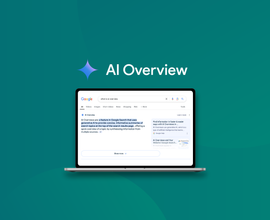Content 101: What is Content Marketing and What Does a Content Marketer Do?
Curious about what content marketing is and what a content marketers does? Read about why the field is crucial to marketing efforts and how it can improve ROI.
You hear it all the time. "Content marketingContent Marketing
Content marketing is a marketing discipline with the goal of increasing awareness and scope for products and brands in the desired target group with content published on the web and offline.
Learn more is king. Content marketing is the new SEO. Content marketing is the only marketing." It might be hyperbole, but content marketing is here to stay.
It pays to know what content marketers do; how they fit into a marketing team. What keeps them up at night?
What is content marketing?
Content marketing is a strategic component of organic marketing, commonly referred to as inbound marketing , that focuses on attracting, engaging, and converting a target audience by providing valuable, relevant, and consistent content that helps them solve their problems. In layman’s terms, content marketing is responsible for website driving traffic and conversions by creating materials highly relevant to key audiences.
The goal of content marketing is to meet customers where they are—whether that’s in their email inbox, on social channels, in SERPs—to increase brand awareness, sales, engagement, and loyalty.
Why content marketing is important
Content marketing is a proven strategy that yields significant results with lower associated costs than other marketing efforts. Just look at the stats:
- 82% of all marketers actively leverage content marketing.
- 79% of content marketers use content marketing to generate high-quality leads.
- Followed by driving traffic to their website (75%) and improving brand reputation (57%).
- Content marketing costs 62% less than traditional marketing and produces 3x as many leads.
- Businesses with blogs generate 67% more leads per month.
- 24% of marketers plan on increasing their investment in content marketing in 2020 and beyond.
Sources: Hubspot and Blogging Wizard
From an ROI perspective, content marketing offers some of the highest returns when done effectively. Much of the ROI is driven through organic efforts but also is more likely to support paid efforts because content is based on user intent, which gives us the foresight to know the content we're creating is desirable and more likely to result in a return on investment.
And besides short-term ROI, content marketing makes it possible for companies to develop a relationship built on trust with potential customers through a more natural approach than traditional marketing efforts.
The basics of content marketing
Content marketing works best when the strategy is centered around delivering the right content to the right audience at the right time. This means creating content for each stage of the sales cycle—awareness, consideration, and decision/conversion—and distributing this content where your audience is looking for it.
By providing valuable content for each stage in the sales cycle, you’re able to answer customer questions, solve their pain points, educate them, and finally show why your product or service is the best option for their needs.
If you’re just getting started in content marketing, here’s a concise step-by-step guide to set you up for success:
- Identify your audience. You can’t create effective, valuable content if you don’t know your audience. Take the time to build out detailed buyer personas, so you are well versed in their priorities, pain points, and interests.
- Set SMART goals. The only way to know if your content marketing campaigns are successful is to establish clear goals and KPIs you’ll use to measure performance from the start.
- Prioritize content channels. All content channels are not created equal. Prioritize the most important and relevant channels to your target audience and focus on producing content for these channels.
- Determine the right format. Just like channels, the format you choose for content can greatly impact its effectiveness. Whether it takes the form of a video, podcast, long-form blog, or gated eBook will be determined based on what your audience engages with most. The most effective content marketing strategies incorporate varied content formats, including infographics, blogs, guides or eBooks, videos, graphics, podcasts, and emails.
- Create and distribute the content. This is the most time-intensive component. Identify how you will create content and invest in quality resources, like internal content writers or proven freelancers, to ensure it meets brand standards. Then determine how you will distribute content. Will you be creating dedicated email campaigns for each persona featuring relevant content? Are you optimizing content to rank high in search results where your audience can find it? High-quality content without a well-thought-out distribution or optimization strategy won’t produce the results you’re looking for.
- Analyze performance. With any strategy in marketing, analysis of performance is key. See which content format received the most engagement. Find out which channels produced the highest conversions. Take these insights and implement them in the content creation process to continue to iterate and improve.
What is an example of content marketing?
One of the most common forms of content marketing is blogs. This is because blogs provide an essentially cost-free opportunity to rank organically in search results for your target audience’s most commonly searched phrases.
Blogs are one of the most effective ways to get in front of your audience when SEO best practices are followed. When one of your blogs ranks on page 1 of Google, this automatically builds trust with users who have been taught through their behavior that the most relevant and trustworthy information is being served to them on that first page.
Another example of content marketing is social media marketing. Creating an engaging Instagram account for your business allows current and potential customers to interact with your brand and learn more about your products and services—without leaving their newsfeed. It also provides a direct line of communication to your target audience on the platforms where they spend the most time. And can eventually drive traffic to your site or even in app-influenced purchases.
What is a content marketer?
A content marketer’s job is so much more than a periodic blog post with a flashy title. A content marketer is responsible for all things content marketing—primarily the creation and execution of an editorial calendar that can include case studies, research, tweets, blogs, videos, white papers, checklists, infographics, emails, letters, webinars, presentation, web copy, and plenty of other creative forms of communication.
All of those forms of communication are sent across different channels and platforms like organic search, email, Twitter, Youtube, SlideShare, StumbleUpon, Facebook, industry publications, and more.
Beyond that, content marketers have to orient their content towards different audiences at different points in their progression towards making a purchase. They have to work with the organic and paid teams to ensure their content gets found by the right people.
Taken all together, this is enough to keep a normal person up at night.
The job requires in-depth knowledge of their audience’s behaviors. What do they care about? How do they search for content? What makes them click to open an article? And most importantly, will they find value in what I write?
After answering these questions and writing the content, content marketers still have to be able to measure how well the content performs, and plan ways to iterate and improve. This means tracking clicks, bounces, social shares, lead gen metrics and sales metrics at each touchpoint.
And in the end, like digital marketers of all stripes, the number one thing a content marketer looks for is ROI. Is the content helping to acquire more customers and convert them? If a content marketer can answer this question with a “yes,” they’re doing it right. They’re getting clicks from the right users, and demonstrating how relevant content can acquire and advance potential customers towards a sale.
What does a content marketer do and what roles do they have?
A content marketer’s primary responsibilities include planning, creating, and distributing content to attract and convert prospects into customers. Here are four of the most common content marketing roles.
- Content Marketing Manager: Typically the leader within a content marketing team, this role is responsible for managing the content calendar, setting deadlines, and overseeing the content creation process from start to finish.
- Content Strategist: Just like the title suggests, this role is responsible for developing and implementing the overall content strategy. They ideate and map content topics to personas, ensure content creation for all stages of the sales cycle, and stay ahead of the latest content marketing trends. Depending on the size of the organization, this role can also be tasked with writing and editing content.
- Content Writer: Also known as a content creator or copywriter, this role focuses primarily on content creation. They do the research, craft the content, and focus on following best SEO practices when writing. The specialized focus of this role is also determined by business size. For larger organizations, this position might specialize in one type of content like email copy. For smaller organizations, they might be tasked with writing all business copy, including website copy, emails, social, blogs, and more.
- Editor: Editors play an important role in content marketing. Not only do they ensure all published content adheres to brand guidelines and is free of grammatical or spelling errors, but they also look for opportunities to make content more engaging and impactful.
Why is SEO important to content marketing?
You can’t have effective, lead-generating content marketing without SEO (Search EngineSearch Engine
A search engine is a website through which users can search internet content.
Learn more Optimization). Similar to content marketing, the goal of SEO is to get the right users to read the right piece of content at the right time. Content marketing focuses on creating content that resonates with the audience. Complementarily, SEO focuses on optimizing content in a way that helps search engines understand it, rank it in search results, and increase the likelihood that current and prospective customers will find it.
Both sides are equally important when it comes to creating content that generates high-quality leads. Content that hasn’t been optimized won’t rank well in search results, meaning you’ll be producing content that no one can find. While optimized content can secure page 1 rankingsRankings
Rankings in SEO refers to a website’s position in the search engine results page.
Learn more or even highly-coveted rich result types like answer boxes or people also ask results, that can translate to thousands or even millions of website visits depending on the search volumeSearch Volume
Search volume refers to the number of search queries for a specific keyword in search engines such as Google.
Learn more for the given phrase.
It’s essential to implement SEO in the initial stages of content creation when developing the content brief. Ensure the content topics you have identified align with competitive keywords for your audience. Collaborate with the SEO expert on your team throughout the content creation process to ensure best practices are followed:
- Do you have the right H1, H2, and H3 tags?
- Does your on-page title include your target keyword?
- Do you have a good balance of internal and reputable external links?
- Have you provided enough value for Google to view you as an authority on the topic?
- Is your content indexable therefore findable by search engines?
These are just a few key components SEO experts will look for in a piece of content, which is why they should be involved in the content brief creation, editing stages, and final publishing.







